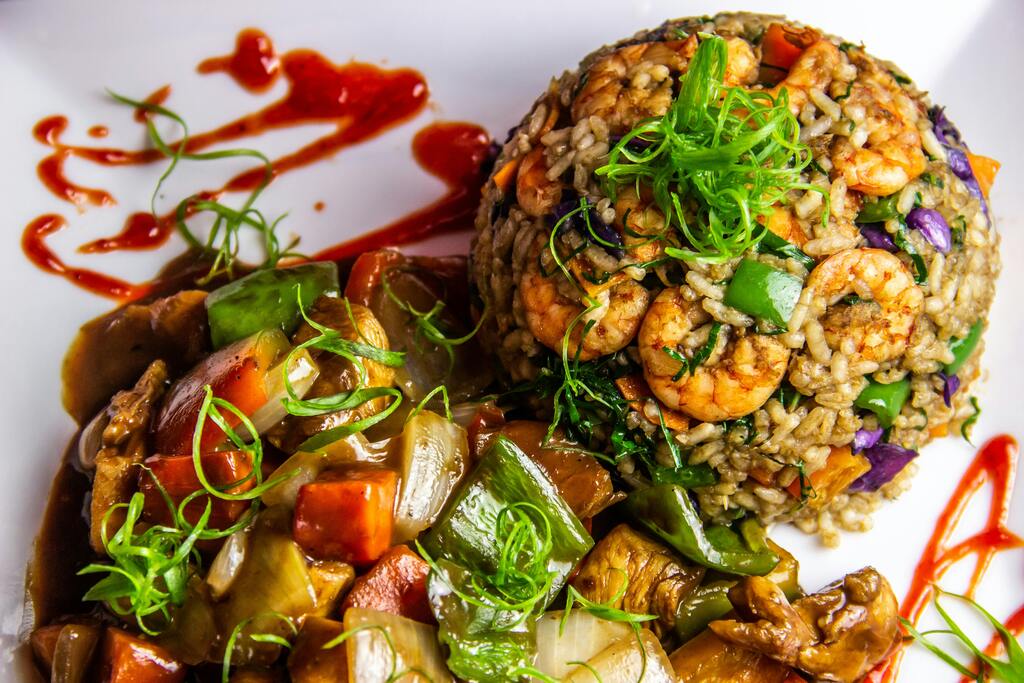Argentine cuisine is heavily influenced by European (especially Italian and Spanish) immigrants, yet proudly shaped by its own land and traditions.
Preferred Cuisine: Grilled meats (asado), empanadas, pasta, dulce de leche
Staple Dish: Asado — a social event and national obsession, featuring beef ribs, chorizo, and other cuts cooked on a parrilla (grill).
Beverage: Yerba Mate — a strong herbal tea shared in a communal cup.
With vast cattle ranches (the Pampas), Argentina is a global capital of beef. Italian-inspired pizza and pasta are also staples in every household.
Bolivian food is deeply influenced by its Indigenous Quechua and Aymara heritage, shaped by high-altitude ingredients and hearty cooking.
Preferred Cuisine: Corn, potatoes, llama meat, soups
Staple Dish: Salteñas — baked pastry pockets filled with meat, potatoes, and a sweet-spicy broth.
Beverage: Api — a warm, spiced drink made from purple corn.
From quinoa fields to Andean valleys, Bolivia’s food is simple, nourishing, and full of character.
As the largest and most populous country in South America, Brazil’s cuisine is vast, regional, and multicultural. Its food blends Indigenous, African, Portuguese, and immigrant influences.
Preferred Cuisine: Rice and beans, cassava, meats, tropical fruits
Staple Dish: Feijoada — a black bean stew with pork, considered the national dish.
Regional Favorites:
Moqueca (seafood stew) in Bahia
Pão de Queijo (cheese bread) in Minas Gerais
Churrasco (grilled meats) in the south
With five major regions, Brazil offers unmatched culinary variety — spicy, savory, sweet, and everything in between.

Chilean cuisine reflects its long coastline, mountainous spine, and European influences.
Preferred Cuisine: Seafood, potatoes, empanadas, stews
Staple Dish: Pastel de Choclo — a sweet corn pie layered with ground meat, chicken, olives, and eggs.
Beverage: Chilean Wine — globally renowned and part of daily life.
Chile’s cuisine is known for its balance — comfort food that’s hearty yet not overly spicy, with fresh ingredients taking the lead.
Colombian food varies widely by region, from the mountains to the coasts to the plains.
Preferred Cuisine: Corn, rice, beans, plantains, soups
Staple Dish: Bandeja Paisa — a generous platter of beans, rice, ground beef, fried egg, plantain, sausage, and avocado.
Popular Dishes: Arepas, Ajiaco (chicken and potato soup), Empanadas
Colombia’s food is filling and festive, often designed for sharing, and always rich in tradition.
Ecuadorian cuisine reflects the country’s unique biodiversity — from mountain valleys to coastal plains to rainforest.
Preferred Cuisine: Potatoes, corn, pork, seafood, plantains
Staple Dish: Hornado — roasted pork often served with hominy and plantain.
Other Favorites: Ceviche (coastal), Locro de Papa (potato cheese soup), Guatita (beef tripe stew)
Each region brings its own flavor: hearty and earthy in the highlands, fresh and citrusy by the sea.
Though geographically South American, Guyana is culturally closer to the Caribbean — but for this article, we include it as part of the mainland for its distinct fusion cuisine.
Preferred Cuisine: Indian, African, Creole, and Indigenous influences
Staple Dish: Pepperpot — a spicy meat stew with cassareep (cassava syrup), often served at Christmas.
Other Favorites: Roti, Curry, Cook-up rice
English-speaking and culturally diverse, Guyanese cuisine is bold, spiced, and full of fusion.
Often overlooked, Paraguay’s cuisine is simple, rustic, and rooted in Indigenous Guaraní culture.
Preferred Cuisine: Corn, cassava, cheese, beef
Staple Dish: Sopa Paraguaya — not a soup, but a savory cornbread with cheese and onions.
Other Favorites: Chipa (cheese bread), Mbejú, Tereré (cold mate)
Food in Paraguay is homemade and hearty, served with a strong sense of tradition.
Peruvian cuisine is internationally celebrated for its innovation and depth of flavor, blending Indigenous, Spanish, African, and Asian elements.
Preferred Cuisine: Potatoes, corn, seafood, chili peppers
Staple Dish: Ceviche — raw fish marinated in lime juice, chili, and onions.
Other Icons: Lomo Saltado, Aji de Gallina, Anticuchos, Pisco Sour
From the Andes to the Amazon to the Pacific coast, Peru’s culinary scene is creative, colorful, and world-renowned.
Like Guyana, Suriname offers a unique fusion of global culinary traditions — South American, Dutch, Indonesian, African, Indian, and Chinese.
Preferred Cuisine: Rice dishes, stews, spicy sauces
Staple Dish: Pom — a baked root vegetable and chicken casserole.
Other Dishes: Roti, Satay, Moksi Meti (mixed meats)
Multicultural and multilingual, Suriname’s food tells the story of its diverse population.
Uruguay’s cuisine is closely related to Argentina’s, with a love for grilled meats and European-style dishes.
Preferred Cuisine: Beef, bread, pasta, pastries
Staple Dish: Chivito — a towering sandwich with steak, ham, cheese, egg, and more.
Popular Traditions: Asado, Mate, Empanadas
Uruguay's food culture is about quality over complexity — fresh, filling, and deeply social.
Despite economic hardship, Venezuelan cuisine remains beloved for its bold flavors and comfort foods.
Preferred Cuisine: Corn, beef, beans, cheese
Staple Dish: Arepas — stuffed cornmeal cakes, a national symbol.
Other Favorites: Pabellón Criollo (shredded beef with rice, beans, plantain), Hallacas, Tequeños
Venezuelan food is flavorful and full of identity, deeply tied to tradition and resilience.

South America is home to some of the most diverse and fascinating cuisines in the world. Every country has its own traditions, ingredients, and signature dishes — yet they all share a deep connection to the land, community, and history.
Whether you're tasting Peruvian ceviche, sipping mate in Uruguay, or diving into Brazilian feijoada, South American cuisine is more than food — it's culture, passion, and pride on every plate.